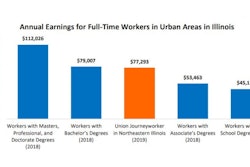
Glenn O. Hawkbaker Inc. pled no contest this week to four felony counts of theft by failure to make required disposition of funds – charges related to violation of the Pennsylvania Prevailing Wage act and the federal Davis-Bacon Act. The charges arise from a three-year investigation by the state attorney general’s office into the company’s practices for calculating and claiming fringe benefit credits.
Hawbaker is a third-generation family-owned construction company with a non-union workforce company that’s been in business for 70 years. It is estimated the company has worked on $1.7 billion worth of contracts between 2003 and 2018.
“We continue to believe that we followed all requirements regarding fringe benefits,” reads a statement Glenn O. Hawbaker issued on Tuesday following the outcome of the stolen wage case brought by Pennsylvania Attorney General Josh Shapiro. “The fringe benefit practices challenged by the Office of Attorney General were based upon advice provided by the company’s former attorneys.
Law360.com reports that while state and federal law requires that prevailing wages be paid in full to workers on qualifying projects — either in their paychecks or to cover the costs of health care and retirement plans — Shapiro said that Hawbaker systematically diverted a portion of its workers' pay for other purposes.
Shapiro’s statement on the case says Hawbaker used money intended for prevailing wage workers’ retirement funds to contribute to retirement accounts for all company employees – including owners and executives and others who are not protected by prevailing wage requirements.
Hawbaker was also charged with grossly inflating the amount it would pay to cover the cost of worker health care plans, and actually paid a much lower rate while pocketing the difference. The company used the money to offset company costs and deflate its bids for public projects, according to Shapiro.
“I’ve heard directly from contractors that follow the law that this enforcement helps their business, and exposing these flagrant examples of wage theft and misclassification will deter employers from engaging in the same illegal schemes. That’s why my office and our partners in law enforcement are committed to this work,” said Shapiro. “If Pennsylvanians step up to report wage theft, know that my office is here to help. We will advocate for you.”
“Hawbaker has always intended to properly pay all of its employees,” according to the company’s statement. “Through the years, both state and federal regulators extensively reviewed our Prevailing Wage Act and Davis Bacon Act practices on jobs and did not find any wrongdoing. This led us to believe we were properly following all laws, and we did not plead guilty. We fully cooperated in this process and proactively addressed concerns raised by the attorney general’s office.”
Glenn O. Hawbaker is sentenced to five years’ probation and agreed to several other conditions including appointment of a corporate monitor to oversee payment of $20,696,453 to the restitution of 1,267 affected workers.
U.S. Secretary of Labor Marty Walsh issued a statement on Pennsylvania Attorney General Josh Shapiro’s announcement that Glenn O. Hawbaker Inc. has today pleaded to and been sentenced for theft relating to violations of the Pennsylvania Prevailing Wage Act and the federal Davis-Bacon Act.
“Contractors working on federally funded projects subject to the Davis-Bacon and Related Acts are required to pay prevailing hourly wages and fringe benefits,” said U.S. Secretary of Labor Marty Walsh in a statement on the Hawbaker case. “The violation of Davis-Bacon and Related Acts in this case is clear. I commend Attorney General Shapiro and the team for their commitment in getting these workers the wages they earned, and leveling the playing field for contractors who play by the rules.”




















